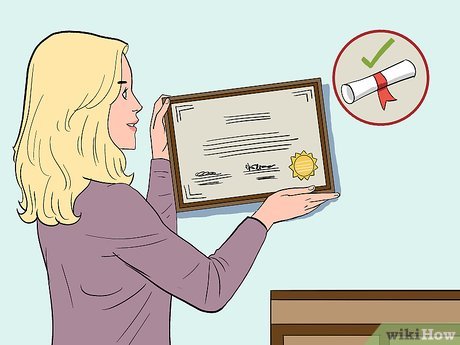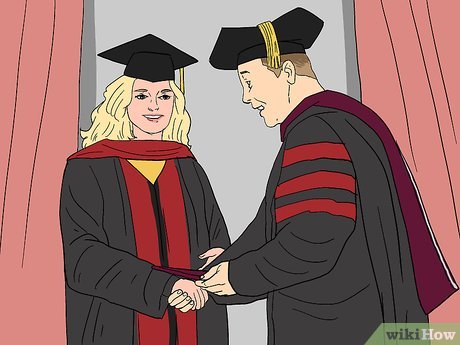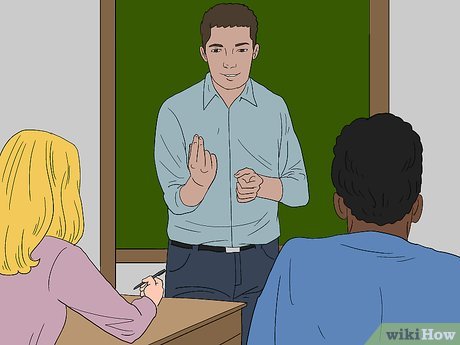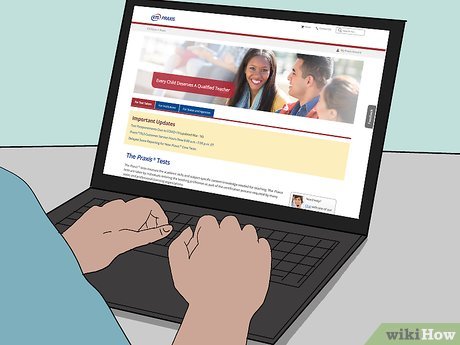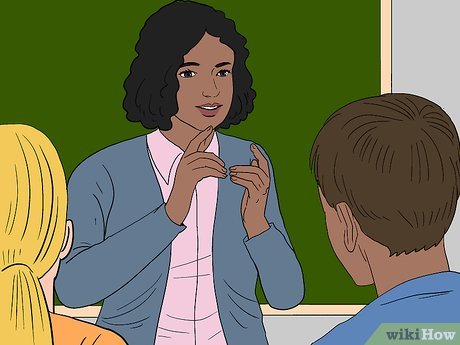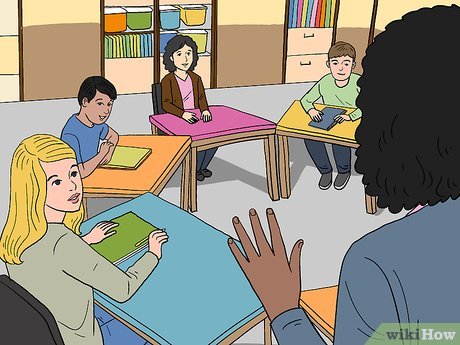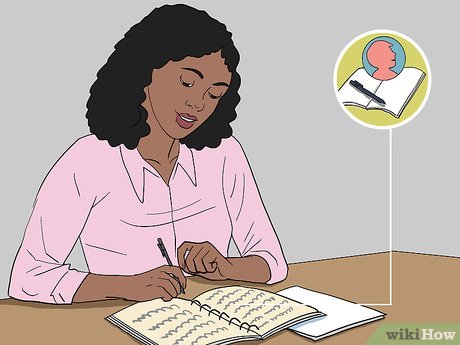How to Become a Teacher of Hearing Impaired Students
Getting an Education
-
 Choose a path in the field of deaf education. The Council on Education of the Deaf specifies 3 different areas of study for potential teachers to focus on. To help you choose, think about the types of places where you want to work and the type of students you want to work with.[1]
Choose a path in the field of deaf education. The Council on Education of the Deaf specifies 3 different areas of study for potential teachers to focus on. To help you choose, think about the types of places where you want to work and the type of students you want to work with.[1]- Oral-aural programs focus on audiology, aural rehabilitation, and different techniques to develop students' listening and speech skills. You'll likely be working with children who have cochlear implants and help prepare deaf educators to work with children in schools or therapeutic settings.
- ASL and English bilingual programs focus on teaching students both ASL and English through reading and writing. You'll need to have a keen grasp of ASL and be aware of the needs of deaf and hard-of-hearing students.
- Comprehensive programs are extremely versatile and will prepare you to work with deaf and hard-of-hearing students in many different settings. Most education programs at colleges and universities fall within this scope. Often times, they'll offer more specific courses in audiology, aural rehabilitation, speech pathology, ASL, cued speech (visual phonetics), or signed English (a combination of signs and finger-spelling to speak specifically in English).
-
 Get a bachelor's degree in education or special education, if possible. Apply to a 4-year undergraduate program online or at a local university. Find a university that offers a degree program where you can study your chosen specialization. If you're not sure, talk to an admissions advisor about what's covered in the different education or special education programs.[2]
Get a bachelor's degree in education or special education, if possible. Apply to a 4-year undergraduate program online or at a local university. Find a university that offers a degree program where you can study your chosen specialization. If you're not sure, talk to an admissions advisor about what's covered in the different education or special education programs.[2]- For instance, a school's special education program might focus on the psychological aspect of deaf and hearing impaired students or it might be geared toward actively teaching those students using ASL and other signed languages.
- If you want to add a minor, choose something that might help you be a better teacher like psychology, English, or—if it's offered—American Sign Language (ASL).
-
 Obtain a Master's degree, if necessary. Look at your state's laws about whether hearing impaired (or special education) teachers need to have a Master's degree. If so, choose a school that has a specialization entitled 'Special Education: Deaf and Hard of Hearing.' To find schools that offer these types of majors, do an online search for 'Master's degree special education' or 'graduate schools special education.'[3]
Obtain a Master's degree, if necessary. Look at your state's laws about whether hearing impaired (or special education) teachers need to have a Master's degree. If so, choose a school that has a specialization entitled 'Special Education: Deaf and Hard of Hearing.' To find schools that offer these types of majors, do an online search for 'Master's degree special education' or 'graduate schools special education.'[3]- You can also get your Master's in education and take specialized courses under that major, if possible.
- Research the school online or call an admissions advisor to see what kind of classes they offer that cover hearing impaired studies.
-
 Learn American Sign Language or any other signed language. If you're currently enrolled in a Bachelor's or Master's program, take ASL to meet your second language learning requirement. You can also sign up for local classes or, if you're extremely disciplined, learn it on your own via books and online courses.[4]
Learn American Sign Language or any other signed language. If you're currently enrolled in a Bachelor's or Master's program, take ASL to meet your second language learning requirement. You can also sign up for local classes or, if you're extremely disciplined, learn it on your own via books and online courses.[4]- Some local libraries and community centers offer free introductory and intermediate courses in ASL.
Training and Licensing
-
 Look up your state's licensing requirements. Every state follows a different protocol for teachers, so be sure to look up the requirements in your state. Some will require you to take a separate teacher preparedness course while others will only require that you take and pass a certification test.[5]
Look up your state's licensing requirements. Every state follows a different protocol for teachers, so be sure to look up the requirements in your state. Some will require you to take a separate teacher preparedness course while others will only require that you take and pass a certification test.[5]- Some private schools don't require teachers to have a teacher's certificate.
- If you want to work as a part-time special education classroom aide, you likely don't need a teaching license. Look up the laws in your state about temporary teachers and check with any schools that you plan on applying to.
- If you want to be a volunteer teacher, you don't need a license, but the school will probably have their own volunteer-training program.
-
 Complete a teacher's certification course in your state. If you want to work in public school, you need to complete a teacher preparation program and, in some cases, a supervised teaching program. In addition to getting certified, some states may require you to take an annual professional development course to maintain your teacher's license. In most states, you'll need to renew your license every 5 years.[6]
Complete a teacher's certification course in your state. If you want to work in public school, you need to complete a teacher preparation program and, in some cases, a supervised teaching program. In addition to getting certified, some states may require you to take an annual professional development course to maintain your teacher's license. In most states, you'll need to renew your license every 5 years.[6]- If you already have a Bachelor's degree, you might be able to get your teacher's certification by teaching under close supervision for a certain number of hours depending on where you live.
-
 Do an alternative certification course, if available. Some states that have a high need for special education teachers will allow prospective teachers to get their license via classroom training and supervised teaching. Part of this training will be in the classroom, followed by student teaching for at least one semester. You'll craft lesson plans, learn how to manage a classroom, and gain valuable teaching experience over the course of 1 or 2 years.[7]
Do an alternative certification course, if available. Some states that have a high need for special education teachers will allow prospective teachers to get their license via classroom training and supervised teaching. Part of this training will be in the classroom, followed by student teaching for at least one semester. You'll craft lesson plans, learn how to manage a classroom, and gain valuable teaching experience over the course of 1 or 2 years.[7]- If you're about to complete a Bachelor's or Master's program, your school may offer a teacher training program.
-
 Pass the Praxis exam to get licensed to teach in your state. Depending on your location, you either need to take the general ('core') Praxis exam or the "Special Education: Core Knowledge and Applications" test. Go to the Praxis website or do an online search to find out which test your state requires.[8]
Pass the Praxis exam to get licensed to teach in your state. Depending on your location, you either need to take the general ('core') Praxis exam or the "Special Education: Core Knowledge and Applications" test. Go to the Praxis website or do an online search to find out which test your state requires.[8]- The test covers a range of topics that assess your ability to teach and work with special needs students. For instance, it covers the characteristics and development of learners, co-occurring conditions, classroom organization and management, and instructional strategies.
- Go to the Praxis website to find a test center and register to take the test.[9]
- The National Evaluation Series (NES) is another licensing test, but not all states accept it. Check your state's laws beforehand if you want to take it instead of Praxis.
Acquiring a Job
-
 Find schools that enroll mostly deaf and hearing impaired students. Most states have schools that are intended to serve deaf and hearing impaired students, so do a basic online search to see your options. You might type 'deaf and hearing impaired elementary school Austin Texas' or 'Los Angeles deaf and hearing impaired college-preparatory school' into the search bar.[10]
Find schools that enroll mostly deaf and hearing impaired students. Most states have schools that are intended to serve deaf and hearing impaired students, so do a basic online search to see your options. You might type 'deaf and hearing impaired elementary school Austin Texas' or 'Los Angeles deaf and hearing impaired college-preparatory school' into the search bar.[10]- If your state doesn't have an entire school intended for deaf and hearing impaired students, research local schools to see if they offer a special education program for deaf and hearing impaired students.
- You can also search for openings on any job search platform like Indeed or SimplyHired.
-
 Reach out to hiring managers at schools with special-ed programs. Look at the school's website to find out who the hiring manager is and call them or send an email inquiry. You might say something like, 'I'm interested in hearing more about your special education program and if you have a need for someone to teach deaf and hearing impaired students.'[11]
Reach out to hiring managers at schools with special-ed programs. Look at the school's website to find out who the hiring manager is and call them or send an email inquiry. You might say something like, 'I'm interested in hearing more about your special education program and if you have a need for someone to teach deaf and hearing impaired students.'[11]- The hiring manager might be the school's general program director, special education director, or head of human resources.
- If you completed teacher training at a particular school, that might be a great place to apply!
-
 Apply for the job and wait to hear back. Send your resume and cover letter to the director, hiring manager, or whoever is responsible for hiring new teachers. If you hear back from them, you'll probably need to do an interview and, in some cases, a trial period where you teach alongside another teacher.[12]
Apply for the job and wait to hear back. Send your resume and cover letter to the director, hiring manager, or whoever is responsible for hiring new teachers. If you hear back from them, you'll probably need to do an interview and, in some cases, a trial period where you teach alongside another teacher.[12]- If you don't hear back a week after sending in your application, feel free to contact the hiring manager and ask about the status of your application.
-
 Go to your teaching interview with the hiring manager. Dress appropriately for your interview and behave in a friendly, professional manner. It may help to think about how to answer common interview questions like, 'Why are you passionate about teaching deaf and hearing impaired students?'[13]
Go to your teaching interview with the hiring manager. Dress appropriately for your interview and behave in a friendly, professional manner. It may help to think about how to answer common interview questions like, 'Why are you passionate about teaching deaf and hearing impaired students?'[13]- Other common interview questions might include: 'What was your experience of school and what led you to want to teach?' or 'How would you handle a situation in which a student is constantly being disruptive during class?'
- You're more likely to be hired around the beginning or end of a semester or school year, but some schools may hire you at any time during the year.
Being a Good Teacher
-
 Expand your capacity for patience and understanding. Deaf and hearing impaired students may take longer to perform certain tasks or, in the case of co-occurring conditions, struggle to grasp certain concepts. Patience is a must in order to slow down and tend to each student's individual learning processes.[14]
Expand your capacity for patience and understanding. Deaf and hearing impaired students may take longer to perform certain tasks or, in the case of co-occurring conditions, struggle to grasp certain concepts. Patience is a must in order to slow down and tend to each student's individual learning processes.[14]- Work on your patience inside and outside the classroom by taking deep breaths whenever you feel flustered.
- Making meditation part of your daily routine will also help you become more patient.
-
 Keep your classroom organized to help your students stay focused. Use color-coded notebooks, cubbies, and labels to help your students navigate the classroom and keep track of what they need to do. Make sure to use a mixture of English and ASL pictograms on the labels.[15]
Keep your classroom organized to help your students stay focused. Use color-coded notebooks, cubbies, and labels to help your students navigate the classroom and keep track of what they need to do. Make sure to use a mixture of English and ASL pictograms on the labels.[15]- For example, arranging the desks in a circle will allow all of the students to see each other and participate in group discussions via sign language.
- A tidy environment will also promote a sense of serenity, allowing students to focus on the lesson and not get distracted by chaos and clutter.
-
 Get creative with your lesson plans. Be adaptable in how you teach your students because something that works for one may not work for another. Furthermore, not every deaf and hearing impaired student is at the same place with their ability to communicate, so find creative ways to plan lessons that cater to each students' needs.[16]
Get creative with your lesson plans. Be adaptable in how you teach your students because something that works for one may not work for another. Furthermore, not every deaf and hearing impaired student is at the same place with their ability to communicate, so find creative ways to plan lessons that cater to each students' needs.[16]- For instance, you might plan group activities so students with a better grasp of ASL and the course material can help other students catch on.
-
 Respect and support your students. Always interact with students in a kind, respectful manner. Positive affirmations are a great way to tell a student that they're appreciated. Children who feel valued and safe will tend to be less anxious and more open to learning.[17]
Respect and support your students. Always interact with students in a kind, respectful manner. Positive affirmations are a great way to tell a student that they're appreciated. Children who feel valued and safe will tend to be less anxious and more open to learning.[17]- Positive affirmations are especially important for children in elementary school because they're still relatively new to a school setting and might feel anxious about it.
Share by
Micah Soto
Update 18 April 2020

